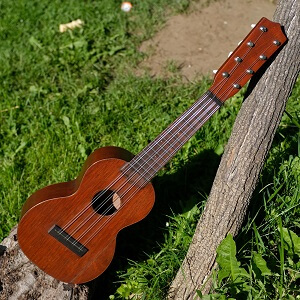Taropatch
 The taropatch, an instrument with eight strings set in four courses of two strings each, tuned to the standard “my-dog-has-fleas.” Taropatches evolved from the Portuguese rajão, a 5-string instrument that is a bit louder than regular soprano ukes due to its slightly larger body size, and offers a more sonorous sound, thanks to the doubled strings.
The taropatch, an instrument with eight strings set in four courses of two strings each, tuned to the standard “my-dog-has-fleas.” Taropatches evolved from the Portuguese rajão, a 5-string instrument that is a bit louder than regular soprano ukes due to its slightly larger body size, and offers a more sonorous sound, thanks to the doubled strings.
Sometimes referred to as “taropatch fiddles” (though they bear little resemblance to violins) the taropatch allegedly got its name from being played in taro fields by native Hawaiians. But scholars suggest that the term was more likely a derogatory slur coined by haoles (white Islanders), who viewed native workers as ignorant and lazy. Mark Twain once referred to indolent native Hawaiian State Legislature delegates as “taropatch members.”
Even though Martin continued to promote and produce taropatches throughout the “uke crazed” 1920s, it remained the least popular of their ukulele line. This was likely because it took more time and trouble to tune the twice as many strings, and it cost about 25 percent more than a regular uke. Martin stopped making taropatches in 1930, but it remained available as a special-order instrument until 1935.